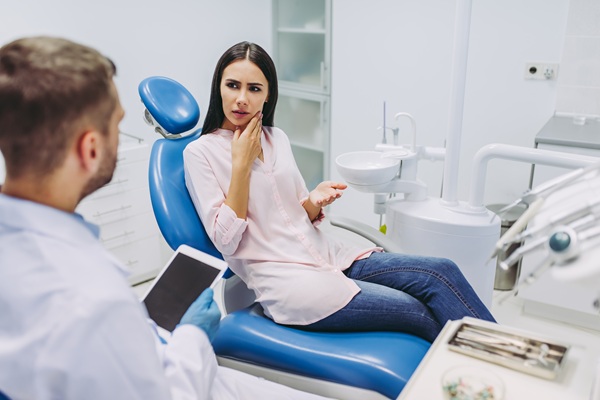Dental Check-Up X-rays at Your Dental Appointment

A dental check-up is essential for oral health and wellness. Dentists recommend that people should make semiannual appointments for a dental exam. This should start when a patient first starts getting teeth. At each checkup, a staff member will take X-rays, in addition to a variety of other preventive steps.
Importance of a regular dental check-up
A patient should not wait to come to the dentist’s office until there is a pressing need. A dentist needs to immediately address a toothache, broken or chipped tooth or gum problems. However, going in for a dental check-up twice a year can help prevent these issues from happening. At a checkup, the dentist and staff members can identify developing cavities, gingivitis, plaque, tartar and other concerns before they get worse. The dentist will also teach the patient how to brush and floss properly.
What X-rays show
A dentist has the knowledge and training to exam a patient’s mouth and teeth. The dentist can spot larger cavities and severe infections with the naked eye and by using a dental tool. However, X-rays can reveal problems that are otherwise difficult to spot. X-rays show conditions in their earliest stages, which can help the dentist come up with a treatment plan. These pictures show what is happening in the person’s teeth, gums and roots. The X-rays will help determine whether the patient may need a filling, root canal or other treatment.
Little concern
Over the years, some patients have expressed nervousness about getting X-rays during a dental check-up. However, there is minimal risk of radiation exposure. Still, the dentist will provide the necessary protection, including a lead-filled covering or apron. Digital X-rays are fast, minimizing any exposure.
When dentists take them
A dental staff member will never take X-rays unless it is for diagnosis or treatment. Normally, this will occur at each dental check-up, though additional X-rays may be required if the patient is getting a root canal, crown or a bridge.
Patients who should and should not get X-rays
In some cases, the dentist will skip the X-ray and use other diagnostic techniques. Pregnant patients should not get X-rays. However, most other people should have them, especially younger children. Young patients still have bone growth and jaw development, making decay more possible and severe. Adult patients who have had extensive restorative work such as fillings and crowns need X-rays more frequently than other people. It is also vital for patients who have a diet high in sugar to get these pictures to identify the possibility of cavities or infections.
Never wait
Even if you believe your oral health is good, you should make regular dental check-ups. Your dentist and the staff will help you maintain strong teeth and gums. X-rays are an important way to monitor any issues, including gum disease and cavities. If it has been a while since you have been to the general dentistry, call today and make an appointment. If you have visible tooth damage or have pain in your teeth or jaw, it is particularly vital to come into the office.
Are you considering getting a dental check-up in the Lilburn area? Get more information at https://www.lilburnfamilydentistry.com.
Check out what others are saying about our services on Yelp: Read our Yelp reviews.
Recent Posts
A restorative dentist can complete your smile by replacing your missing teeth. This can bring back your oral health and self-esteem. Knowing what teeth replacement method will suit you can help prepare you for your appointment. Here are the details on how seeing your restorative dentist can replace your lost teeth.These removable dental replacements are…
A chipped tooth can affect your smile's appearance and oral health, leading to discomfort, sensitivity, and self-esteem issues. Fortunately, there are several effective options to restore a tooth's natural look and strength. A variety of treatments are available, depending on the severity of the chip, its location, and your treatment goals.A chipped tooth can result…
Restorative dentists do not only repair damaged teeth. They also enhance overall oral health. From addressing cavities to replacing missing teeth, these dental professionals provide a variety of treatments that restore the function of damaged teeth and protect your oral health.Restorative dentistry is the dental specialty that restores damaged and decayed teeth. These professionals also…
A restorative dentist plays an important role in dental health and aesthetics. Damaged or missing teeth can impact a smile's appearance and cause problems for oral health and function. This is why restorative dentists offer a range of repair and replacement procedures to keep a patient's smile looking and feeling the way it should.A restorative…


